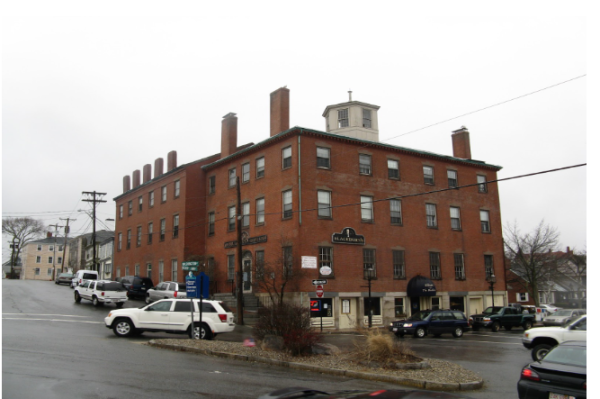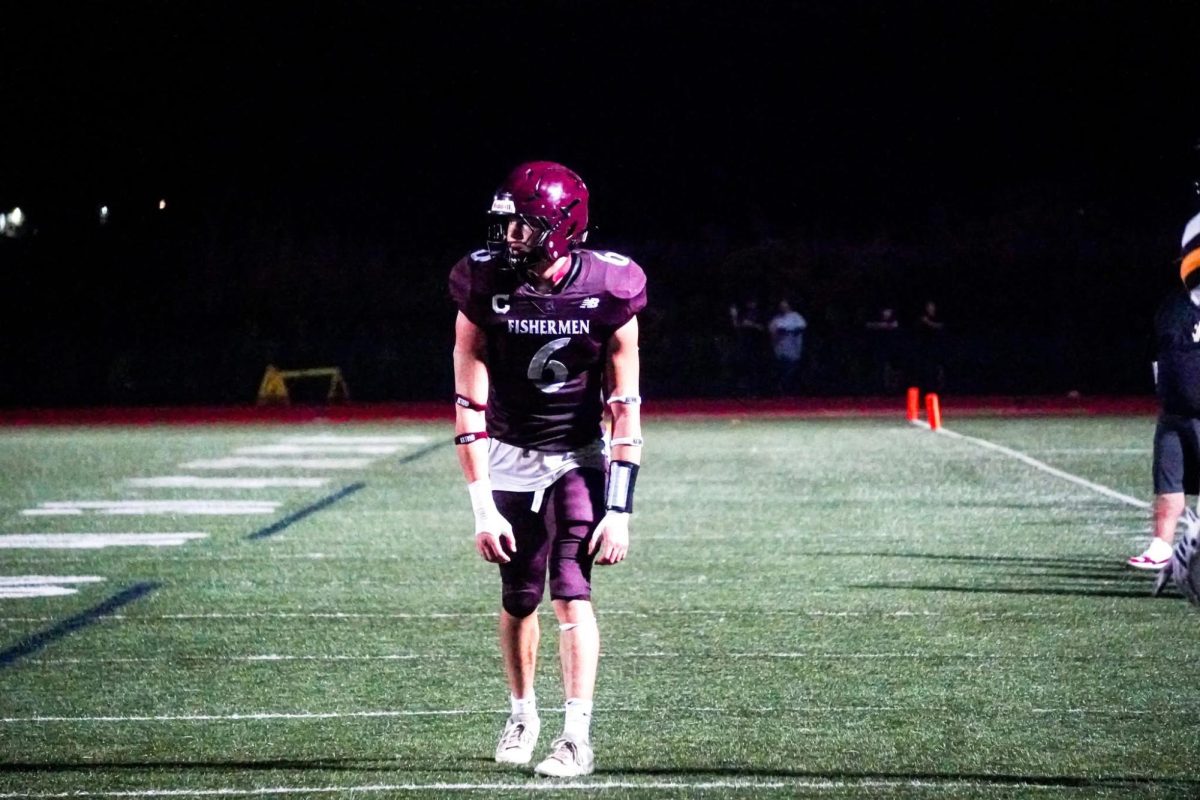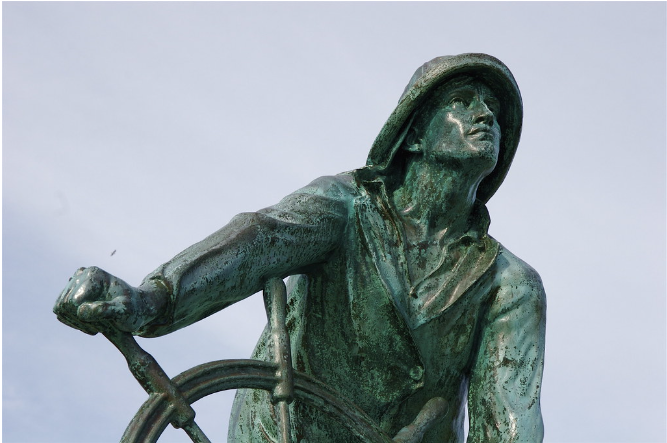Blackburn’s story
If you grew up in Gloucester, or maybe even in an East Coast fishing family, there’s a good chance you’ve heard of Howard Blackburn. An old story your friends or family might’ve told you about to simply leave you in awe. On the surface, that’s all the story may have meant to you, and not much else crossed your mind other than the disbelief of his story.
Gloucester, Massachusetts is known to the world as America’s Oldest Seaport and has enjoyed a rich history since its inception in 1623. In those 401 years, the fishing industry, immigrants, and fishermen have worked hand in hand in developing what has become Gloucester’s culture. Howard Blackburn enjoyed being a representative of those three core groups and subsequently has become a part of Gloucester’s history and culture.
When asked about the importance of being a Gloucester fisherman, responses focused on the historical importance that comes with the job.
“I believe it is a part of Gloucester’s history to be a fisherman,” said Gloucester resident and relative of a long line of fishermen, Kelly Frontiero. “It is and was crucial to the development of our city.”
Blackburn would have no difficulty adapting to Gloucester’s history of fishing and he was certainly able to contribute to the development of Gloucester.
The “Man of Iron” was born on February 17, 1859 in Nova Scotia, Canada. He, like many others, immigrated to Gloucester at age 18 and used his early interests in the sea to pursue a career in the fishing industry.
It would not be till 1883 until Blackburn would make his impact on Gloucester when he decided to set sail from the seaport in search of halibut. His winter venture took place aboard the Grace L. Fears, where he sailed alongside Thomas Welch. Off the coast of Newfoundland, in Grand Banks, the two were thrown off course from their mother ship and were forced to navigate on their own; the next morning Welch died as Blackburn’s hands began to freeze. Now alone and stranded, he removed his gloves and formed his frozen hands around the oars. He rowed for five days with scarce resources before he reached land. Blackburn lost all his fingers and multiple toes in the aftermath of the ordeal.
That’s the story that led him to be known as the “Man of Iron”. A story of resilience and overcoming the dangers of the sea. A story that changed his life and would be told for generations to come. Still, his story occurred over 100 years ago. It begs the question, whether or not Blackburn’s legacy of heroism continues to persist in Gloucester today?
Heroism (Then)
To answer this question, we have to first compare his story to heroism and its evolution as an idea.
Fishing has long been a hazardous occupation and even more so in Howard’s time. In the year he voyaged an upwards of 209 fishermen lost their lives in Gloucester alone.
With that in mind, when Blackburn returned to Gloucester, he was hailed a hero and received $500 (around $15,000 today) in donations from the people of Gloucester, which was used to open up his Tobacco and Cigar shop which he named “The Blackburn Tavern”.
At a public event last year, Massachusetts State Senator, Bruce Tarr, reflected on Howard Blackburn.
At the event, Tarr spoke about how Blackburn’s “life story reflects many of the foundational virtues of the nation’s oldest seaport”
His story made him a hero, yes. Yet how did he reflect the foundational virtues of Gloucester?
Howard’s connection to the city deepened after his return and he became much more than an extraordinary story: he became a figure who exemplified what it meant to be fishermen and a Gloucester resident. He was an immigrant who defied the odds and made a life for himself. That remains a foundational virtue of the city that is intertwined with traditional heroism.
Traditional heroism entails a show of bravery and perseverance in the face of danger; overcoming what is deemed impossible. Blackburn demonstrated that to a large extent and was thus able to be enshrined into Gloucester history. So when understanding that he was certainly celebrated based on traditional ideas, it’s no surprise that he was honored as a traditional hero.
In the traditional understanding, Blackburn’s contributions cannot be understated. However, the individuality of such stories and its concrete lessons can lead some to consider how these figures stack up against what we believe heroism is today.
Heroism (Now)
Modern heroism tends to stray from the individuality of the traditional ideas that make someone a hero. Typically, empathy for others or concern for a greater community is what makes someone a hero. Someone who’s selfless. Someone who looks to inspire. Someone who looks to better his community. Howard Blackburn is that someone.
Two years after he opened his tavern, Blackburn donated $500 to fishermen widows and fatherless children. His tavern and his charitable nature cemented him as a “Gloucester hero” and he became more involved with the city as more time went on. Later in his life, Blackburn would eventually urge the Fishermen’s institution to create an unemployment relief fund for the ongoing Great Depression and according to Kory Cucuru in his documentary on Blackburn, Howard Blackburn: Gloucester’s Most Legendary Fisherman is said to have donated up to $50,000. His tavern became a place for visitors and locals to come and learn of his story; Blackburn embraced being a hero of all forms.
A further testament to his character can be found in an interview recounting his original story shortly before his death in 1932.
“I cannot just now [go for treatment], I want a couple of men to get in the dory with me and go down to the mouth of the river for my dorymate” Blackburn stated.
Blackburn lived by values that made him a hero his whole life and even at his most difficult times, put his friends and companions first.
When we look back at what Gloucester’s “foundational virtues” are, we think of the close community and rich history of the fishing industry: resilience and hardwork. These virtues continue to shape the current state of the city or its “polis” as Charles Olson would describe it. What makes diving into the evolution of heroism so interesting is that it’s not difficult to see how a perceived “heroic” act can impact a culture or history in the short-term. Rather, it’s more difficult to find how it continues to impact a city or town and oftentimes, we see historical figures who once were exemplary figures of a traditional heroism fizzle out as time moves past them.
For Howard Blackburn, this is not the case, as his transcendent figure continues to mold how the city and its people instill values into their community.
Continuity and Celebration
Beyond sentimental value and symbolic presence, where do we see Blackburn’s impact around us?

For starters, Blackburn’s Tavern remains on Main Street as it serves as a continuous reminder of his legacy and his charity despite not operating as it had before. Since his death, several sites have been named after him to continue celebrating his contributions to the community that he joined as a young man: Blackburn Circle, named in his honor serves as a daily reminder of his life as residents and tourists alike pass through it; Blackburn Industrial Park operates as recognition of his contributions as a Gloucester businessman. Other locations like Blackburn Drive, The Blackburn Center, and the Howard Blackburn Memorial further cement his impact on the city as the people of Gloucester are constantly reminded of his tremendous influence.
It’s not just Gloucester that’s inspired by someone as impressive as Blackburn. In 2002, former teacher Nathaniel Stone, having learned of Blackburn’s efforts, decided to embark on his own voyage that began in Brooklyn and took a similar route to Blackburn’s voyage. While this doesn’t exactly illustrate how he impacts Gloucester directly, it more so indirectly is about how Blackburn has been able to give Gloucester a figure that those across the country can look to and that is something in of itself that remains invaluable to a city like Gloucester.
More recently, Blackburn was the subject of a dedicated day for the Gloucester 400th anniversary in which Kory Curcuru’s Howard Blackburn: Gloucester’s Most Legendary Fisherman debuted. The day was erected to commemorate Blackburn alongside the Blackburn challenge: a 20+ mile circumnavigation of Cape Ann meant to further honor him.
“All to honor the unbreakable spirit of Gloucester’s most legendary fisherman, Howard Blackburn” said Curcuru, in his 2023 documentary.
It’s clear to see that despite every year that we are removed from Blackburn’s life, his presence within the city was so grand that time or the evolution of ideas of what makes someone eligible to be honored, cease to affect his status as a hero to those that know his story.
“He symbolizes hard work and dedication,” said Kelly and Brandon Frontiero, whose family knew Howard’s family. “Yes [he deserves his status in Gloucester], due to his perseverance.”
The strongest component about someone like Blackburn’s that his story is universal and can make an impact on anyone, anywhere; old and young can take something from him and redistribute it back into the community.
“[His story] shows the grit of our fishing community and fishing industry as a whole,” said GHS Junior Brady Messier. “I think I can take things like determination from his story and a drive to see my goals finished. I think his story is important to young people because there’s a lot to learn from it.”
Blackburn represents all key aspects of what we think of when presented with the idea of “Gloucester culture”. His ability to preserve, adapt, maintain selflessness, makes him someone that breaks the mold of the typical impressive, but unrelatable hero. Despite the changes Gloucester has gone through over the years and the changes it will continue to endure, Howard Blackburn will always live as a reminder of what it means to be a hero, fishermen, and a Gloucestermen.











![The GHS/MERHS senior cross country runners pose together on Senior Night. [Photo courtesy of Manchester-Essex Athletics]](https://thegillnetter.com/wp-content/uploads/2025/10/Screenshot-2025-10-10-at-11.18.29-AM.png)

















